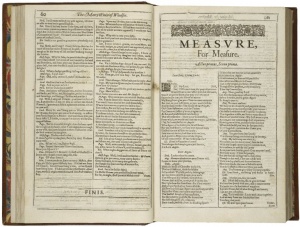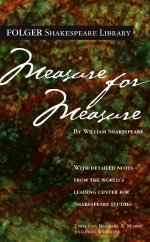Measure for Measure: Difference between revisions
SophieByvik (talk | contribs) (Created article and stubbed based on Cymbeline) |
m (Text replacement - "<references>" to "<references />") |
||
| (24 intermediate revisions by 4 users not shown) | |||
| Line 1: | Line 1: | ||
This is the | ''This article is about Shakespeare's play. For other uses, see [[Measure for Measure (disambiguation)]].'' | ||
''Measure for Measure'', one of [[William Shakespeare's plays]], is among the most passionately discussed of his works. In it, a duke temporarily removes himself from governing his city-state, deuptizing a member of his administration, Angelo, to enforce the laws more rigorously. Angelo chooses as his first victim Claudio, condemning him to death because he impregnated Juliet before their marriage. | |||
Claudio's sister Isabella, who is entering a convent, pleads for her brother's life. Angelo attempts to extort sex from her, but Isabella preserves her chastity. The duke, in disguise, eavesdrops as she tells her brother about Angelo's behavior, then offers to ally himself with her against Angelo. | |||
Modern responses to the play show how it can be transformed by its reception in present culture to evoke continuing fascination. To some, the duke (the government) seems meddlesome; to others, he is properly imposing moral standards. Angelo and Isabella's encounter exemplifies sexual harassment. Others see a woman's right to control her body in Isabella's choice between her virginity and her brother's life. | |||
Shakespeare is believed to have written ''Measure for Measure'' in 1604; it was performed at court that December. The play was first published in the First Folio in 1623. His principal source for ''Measure for Measure'' was another play, George Whetstone's two-part ''Promos and Cassandra''.<ref>Adapted from the Folger Library Shakespeare edition, edited by Barbara A. Mowat and Paul Werstine. © 1997 Folger Shakespeare Library.</ref> | |||
== Productions at the Folger == | == Productions at the Folger == | ||
*[[Measure for Measure (Folger Theatre, 2006)|''Measure for Measure'' (Folger Theatre, 2006)]] | *[[Measure for Measure (Folger Theatre, 2006)|''Measure for Measure'' (Folger Theatre, 2006)]] | ||
:[[Helen Hayes Awards]] | |||
:''Wins'': "Outstanding Resident Play," "Outstanding Director, Resident Play" for Aaron Posner | |||
:''Nominations'': "Outstanding Lead Actor, Resident Play" for Mark Zeisler, "Outstanding Lighting Design, Resident Production" for John Hey, "Outstanding Set Design, Resident Production" for Daniel Conway, and "Outstanding Sound Design, Resident Production" for Neil McFadden. | |||
*[[Measure for Measure (Shenandoah Shakespeare Express, 1998)|''Measure for Measure'' (Shenandoah Shakespeare Express, 1998)]] | *[[Measure for Measure (Shenandoah Shakespeare Express, 1998)|''Measure for Measure'' (Shenandoah Shakespeare Express, 1998)]] | ||
== Early editions == | == Early editions == | ||
[[File:STC 22273 Fo.1 no.68 F1r.jpg|thumb|300px|right|The title page of ''Measure for Measure'' printed in the 1623 First Folio. STC 22273 Fo.1 no.68.]] | |||
'''First Folio''' | |||
:LUNA: [http://luna.folger.edu/luna/servlet/s/v6mbv8/ First Folio]: F1r - G6v | |||
:Hamnet: [http://shakespeare.folger.edu/cgi-bin/Pwebrecon.cgi?BBID=78903/ STC 22273 Fo.1 no.68] | |||
== Modern editions == | == Modern editions == | ||
[[File:Measure for Measure Folger Edition.jpg|150px|right]] | |||
''Measure for Measure'' can be read online with [http://www.folgerdigitaltexts.org/?chapter=5&play=MM&loc=p7/ Folger Digital Texts] and purchased from [http://books.simonandschuster.net/Measure-for-Measure/William-Shakespeare/Folger-Shakespeare-Library/9780743484909/ Simon and Schuster]. | |||
Hamnet link to Folger Edition: [http://shakespeare.folger.edu/cgi-bin/Pwebrecon.cgi?BBID=192175/ PR2753 .M6 copy 2 v.22] | |||
==In popular culture== | |||
== Translations == | == Translations == | ||
The Folger owns just under 10 stand-alone translations of ''Measure for Measure'' in various languages (not including collected works). Cataloging of these works is ongoing as of early 2015, and many have full-level catalog records, but some works still have only partial records. Translations can be found [[Hamnet]] in by searching for "Translations"in the '''Genre/Form Term''' field, or by searching the '''Call Number (Left-Anchored)''' field for call numbers starting with PR2796 (see the list of [[List of Sh.Col. call numbers#PR2796 .E2.80.93 Translations|Sh.Col. translations call numbers]] for specific language call numbers). Since not all translations are fully cataloged, some items may only turn up in one of these searches. | |||
== Performance materials == | == Performance materials == | ||
== Other media == | == Other media == | ||
== Notes == | |||
<references /> | |||
[[Category: William Shakespeare's works]] | |||
[[Category: Plays]] | |||
[[Category: William Shakespeare's collaborations]] | |||
[[Category: Comedies]] | |||
[[Category: Measure for Measure]] | |||
[[Category: Public programs]] | |||
[[Category: Folger Theatre]] | |||
[[Category: Shenandoah Shakespeare Express]] | |||
[[Category: Helen Hayes Award]] | |||
[[Category: 17th century]] | |||
[[Category: Early modern drama]] | |||
Latest revision as of 11:19, 27 August 2018
This article is about Shakespeare's play. For other uses, see Measure for Measure (disambiguation).
Measure for Measure, one of William Shakespeare's plays, is among the most passionately discussed of his works. In it, a duke temporarily removes himself from governing his city-state, deuptizing a member of his administration, Angelo, to enforce the laws more rigorously. Angelo chooses as his first victim Claudio, condemning him to death because he impregnated Juliet before their marriage.
Claudio's sister Isabella, who is entering a convent, pleads for her brother's life. Angelo attempts to extort sex from her, but Isabella preserves her chastity. The duke, in disguise, eavesdrops as she tells her brother about Angelo's behavior, then offers to ally himself with her against Angelo.
Modern responses to the play show how it can be transformed by its reception in present culture to evoke continuing fascination. To some, the duke (the government) seems meddlesome; to others, he is properly imposing moral standards. Angelo and Isabella's encounter exemplifies sexual harassment. Others see a woman's right to control her body in Isabella's choice between her virginity and her brother's life.
Shakespeare is believed to have written Measure for Measure in 1604; it was performed at court that December. The play was first published in the First Folio in 1623. His principal source for Measure for Measure was another play, George Whetstone's two-part Promos and Cassandra.[1]
Productions at the Folger
- Helen Hayes Awards
- Wins: "Outstanding Resident Play," "Outstanding Director, Resident Play" for Aaron Posner
- Nominations: "Outstanding Lead Actor, Resident Play" for Mark Zeisler, "Outstanding Lighting Design, Resident Production" for John Hey, "Outstanding Set Design, Resident Production" for Daniel Conway, and "Outstanding Sound Design, Resident Production" for Neil McFadden.
Early editions
First Folio
- LUNA: First Folio: F1r - G6v
- Hamnet: STC 22273 Fo.1 no.68
Modern editions
Measure for Measure can be read online with Folger Digital Texts and purchased from Simon and Schuster.
Hamnet link to Folger Edition: PR2753 .M6 copy 2 v.22
In popular culture
Translations
The Folger owns just under 10 stand-alone translations of Measure for Measure in various languages (not including collected works). Cataloging of these works is ongoing as of early 2015, and many have full-level catalog records, but some works still have only partial records. Translations can be found Hamnet in by searching for "Translations"in the Genre/Form Term field, or by searching the Call Number (Left-Anchored) field for call numbers starting with PR2796 (see the list of Sh.Col. translations call numbers for specific language call numbers). Since not all translations are fully cataloged, some items may only turn up in one of these searches.
Performance materials
Other media
Notes
- ↑ Adapted from the Folger Library Shakespeare edition, edited by Barbara A. Mowat and Paul Werstine. © 1997 Folger Shakespeare Library.

